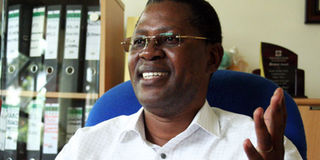I have no regrets in life - Badagawa

Mr Badagawa believes in honesty at work. PHOTO BY ABUBAKER LUBOWA
Give us a brief about Gideon Badagawa?
The 46-year-old Gideon Badagawa was born in a little village called Muyiira in Nambale Sub -County, Iganga District, to Mr and Ms Isabirye Badagawa. His father is a retired Grade II Magistrate.
Badagawa is the fourth child in a family of 12 and a Statistician by training. He went to school at Busoga College Mwiri, Makerere College School and later joined Makerere University in 1988 for his first degree in Statistics.
He is married to Susan Badagawa and is a father to two daughters; Anita and Nina. Mr Badagawa has a Master’s degree in Development Economics from the ISS The Hague in the Netherlands and a post graduate diploma in Environment Management from the Maastricht School of Management in the Netherlands.
He taught at the ISAE, in the department of Planning and Applied Statistics from 1992 until 2000 when he joined PSFU as Senior Policy Analyst. He later rose through the ranks as Manager and Director for policy advocacy before proceeding to work with Uganda Manufacturers’ Association as Executive Director in 2008.
What’s your day schedule like?
I rise at exactly 5am every day to prepare for the day, beginning with a prayer. I then proceed to do a 15-minutes exercise, usually guided by a TV programme. I proceed to have breakfast after which I go to office just before 7am. Every week day is busy, with a balance between, staff supervision, office work including preparation of policy briefs for presentation to my constituency – the business community and to government. This is punctuated by the never-ending meetings both internal and external. I usually leave office after 7pm.
How many hours do you averagely put in every day for your work and family?
On average, I work 11 hours a day (in some cases I carry work home) and give my family and leisure about four hours.
How do you take off your job to relax?
This is usually on weekends and I prefer relaxing out of town with my family.
What has been your biggest achievement as an employer?
I have been successful in building a strong team at PSFU with zeal to work hard and support the private sector. This cuts across programmes and projects. You may know that the appreciation of PSFU as a representative body of Uganda’s private sector has risen to a much higher level, especially in recent years. The image and visibility of PSFU as well as its capacity to deliver on various assignments, including projects has improved tremendously.
And as an employee, when you were starting out?
Throughout the period I have been an employee both at Makerere University as a lecturer and with the private sector in various capacities, I have come to learn that respect, creativity, innovation, hard work, humility and integrity are some of the key ingredients any useful employee and particularly those that are treading a specific career path must have. It is important to be a fast learner and reduce the amount of time your employer must put in to supervise you.
If you had to live it all over again, would you choose another career and why or why not?
I have nothing much to regret in life and I think God has done it for me. I have served as an academic, as a business representative and as a business person. I am inspiring many youths towards enterprise development across the country.
I have always cherished being a leader and I am urging the youths, especially who want to join politics immediately after school to always think about business first. It is more honorable to be a business person than a politician because then you have the freedom to shape your own destiny.
What would you be doing in 10 years’ time?
I expect to have retired to my own businesses and probably I will have more time for my family.
How would you change your industry if you had the power?
Employment creation is a key facet for business and politics. This for the larger part is provided by the private sector. However, the private sector cannot grow and provide jobs without transformation in agriculture and industry. These key sectors require good physical infrastructure, power for value addition, skills upgrading, business development support, including affordable business finance.
These are required to help strengthen both the forward and backward linkages. You also need the distribution, transport, insurance, banking and other services to support the value chain.




